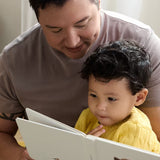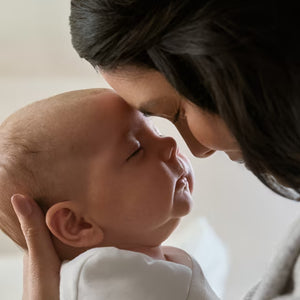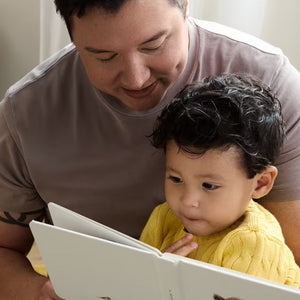When babies start to crawl, sleep can become tricky. It can even feel like a crawling sleep regression. Let’s talk about when babies start crawling, how it impacts sleep, and how you can help your baby when sleep is disrupted.
When do babies start crawling?
Babies typically start crawling between seven and ten months old.(1) Keep in mind, every little one develops at their own pace, so some babies may begin crawling earlier than that age, while others may start later. A few babies even skip crawling altogether. This is usually not a cause for concern as long as your baby is equally using both sides of their body.(1) If you have any concerns about the way your baby is moving (or not moving), please be sure to speak with your pediatrician.
Can crawling cause a sleep regression?
It can! Any time a baby is learning something new, it’s possible to see sleep disruptions. Research actually shows that sleep changes often occur when a baby reaches the crawling milestone.(2) But, this doesn’t mean sleep is disrupted forever!
Expert Tip: There is also a sleep regression that many parents see around 8-10 months. Crawling can be one contributing factor for this regression, but there are other developmental strides happening around this age too. If you’d like to learn more about what your baby is experiencing at this age, I have a blog all about the 8-10 month sleep regression.
Are sleep regressions based in science?
When a baby’s brain is busy learning new things or developing, sleep can take a back seat.(2,3) Also, as babies grow, their sleep needs change.(4,5,6) This means a baby may begin to struggle with more night wakings, with nap refusals, and with falling asleep. When sleep is interrupted this way, it can feel like everything is moving backwards, hence the term “sleep regression.”
However, sleep isn’t actually going backwards or permanently “regressing.” Sleep skills don’t just disappear at magical ages. When I talk about common sleep regression ages, I’m talking about ages when babies and toddlers often experience periods of development (physical, cognitive, social) or commonly have a change in sleep needs (Think fewer naps, more awake time, etc..). But truly, all babies develop at their own pace, meaning sleep could be interrupted because of new skills, cognitive progressions, or physical shifts at any age.
How long does a sleep regression from crawling last?
A sleep regression associated with crawling typically lasts about 1-2 weeks. Maintaining healthy sleep habits and having a plan to get back on track can help minimize sleep disruptions. On the other hand, inconsistency or introducing new habits can cause a sleep regression to turn into a long-term struggle.
Why is my baby crawling in their sleep?
Do you get excited when you reach a goal? So do babies! Crawling is exciting. That excitement can make it difficult for a baby to fall back asleep during a night waking.(2) They want to practice any chance they get, even during sleep times. Why would your baby want to sleep when they can explore their newfound skill?
How can I help during a crawling sleep regression?
1. Practice during the day.
Make sure you have plenty of floor time during the day. Keep practicing tummy time. Don’t rush to hand your baby a toy that is just out of reach. That small frustration of not being able to get what they want will encourage them to crawl. Practice helps them master the skill, which makes it a little less exciting when it’s time for sleep. As a bonus, this active awake time supports better sleep.
2. Consider a sleep sack.
Sleep sacks can make crawling feel frustrating rather than exciting. They’re also a great cue that playtime is over, and it's time for sleep.
3. Be patient, and stay consistent.
Learning a new skill is hard and exciting, and sleep often takes a backseat when your baby's brain is busy. This will pass with consistency and patience. There's no need to make changes to your normal routines and sleep strategies if they were working for you before this crawling sleep regression.
4. Have a plan for now and the next big skill.
A benefit of having a great little sleeper is that regressions and new milestones are often short-lived and easier to navigate. The best way to navigate a sleep regression is to have great sleep skills before you hit that regression. Let me hand you the tools to make it through this sleep setback and to help prevent major disruptions in the future. I’ll show you how to meet your baby right where they are developmentally and remain emotionally connected while you help them master their sleep skills.








